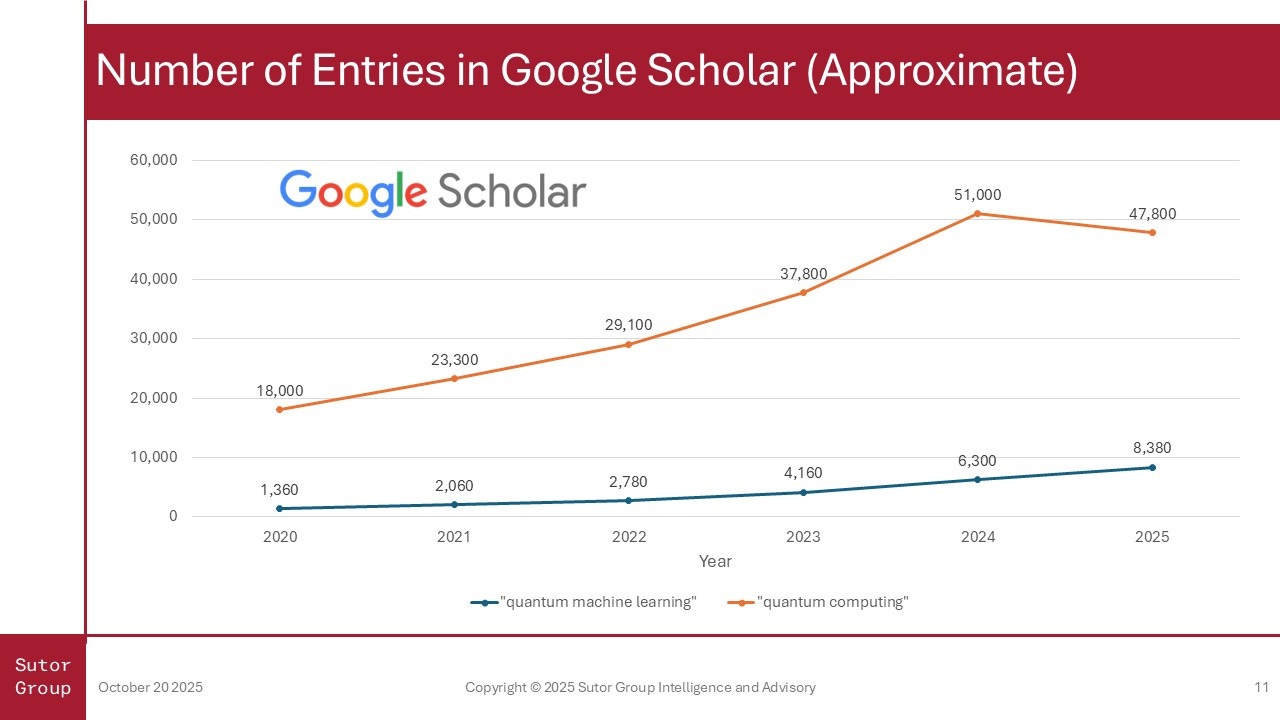A Data Point on the Growth of Quantum Machine Learning (QML)
Let's look at some publication counts.
During my keynote last week at the Inside Quantum Technology Q+AI conference in New York City, I showed the slide above comparing the number of Google Scholar entries containing “quantum machine learning” versus “quantum computing.”
The data for the fourth quarter of 2025 is incomplete, as we are only one month into it. It’s not surprising that the general quantum computing numbers are larger and are outpacing the QML ones. Nevertheless, the QML counts are healthy and the slopes are increasing (modulo final Q4 numbers).
There are many caveats we should apply to this data:
It is likely incomplete.
I just searched for those key phrases, so it is not clear how much each paper focuses on them.
It says nothing about the quality of the papers, and the number of papers in respected peer-reviewed journals would be useful to know.
In any case … there is a lot of research work on QML, but this has not translated to any broad commercial production use.
I think this NISQ era is a short period compared to the long quantum-enhanced computation future. We may even look back at this pre-fault-tolerant and pre-large-scale period as quaint, as in “Can you believe what those people thought they could do with NISQ?!”.
However, what will get us to that future is research, and some of those potential applications will involve quantum-assisted AI. So, whatever the caveats, it’s good to see this QML work even if it doesn’t really pay off for several years.
In the meantime, machine learning can improve quantum computation itself in the following ways:
Quantum Error Correction (QEC) and Mitigation
Error detection and correction
Noise modeling and prediction
Discovery of new QEC codes
Quantum Processor Optimization and Control
Automated calibration
Determining optimal control sequences to minimize noise
Enhancing qubit readout fidelity
Algorithm and Circuit Optimization
Quantum circuit reduction techniques
Optimizing quantum state preparation
Designing smarter transpilers
In essence, we are using AI to improve quantum computation so we can use it for AI (which could be used to improve quantum computation …).
Sutor Group Intelligence and Advisory
Dr. Bob Sutor is the CEO and Founder of Sutor Group Intelligence and Advisory. Sutor Group offers comprehensive market insights and in-depth technical expertise, drawing on over four decades of experience working with startups and large corporations. It advises Deep Tech startups, companies, and investors on quantum technologies, AI, and other emerging tech fields.
Sutor Group shares its knowledge and analysis through direct client engagements, seminars, reports, newsletters, books, written and on-air media appearances, as well as speaking and panel moderation at top conferences and client events.
Legal Stuff
Visit the Copyright, Notices, Disclosures, Disclaimers, and Licenses on the Sutor Group website for applicable legal information for this content.


